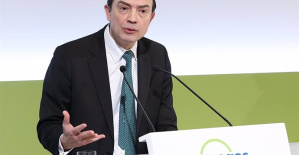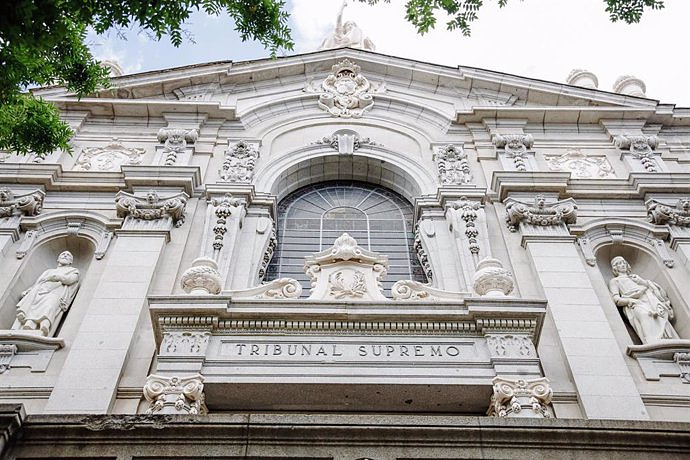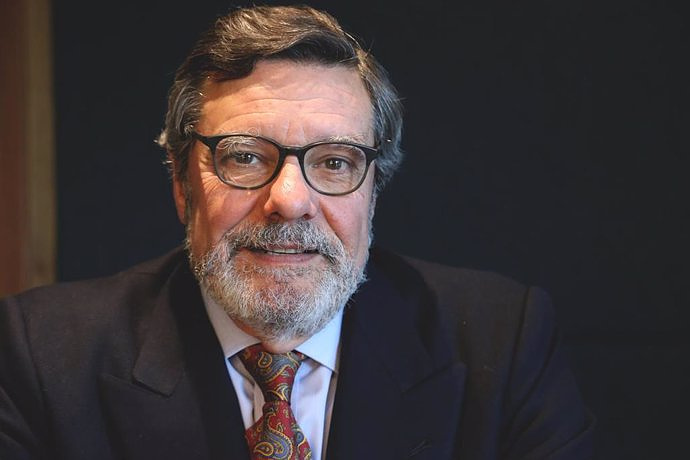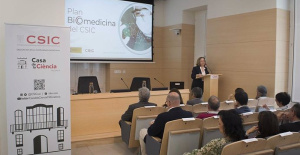Resignation to fight bicephaly in the Judiciary after the decision of the TS to keep Mozo in his position
The member of the General Council of the Judiciary (CGPJ) Wenceslao Olea has communicated this Wednesday to the Supreme Court (TS) that he is withdrawing the appeal he filed against the appointment of his colleague Rafael Mozo as interim president of the CGPJ, after the TS has rejected hours before provisionally suspend said appointment.
As reported by the high court, once he learned of the decision of the Contentious-Administrative Chamber of the Supreme Court to keep Mozo as interim president, Olea sent a letter to the same Chamber announcing that he was renouncing the challenge.
However, it should be remembered that the Third Chamber still has in its hands the appeal filed against the promotion of Mozo by the general secretary of the CGPJ, José Luis de Benito.
The Sixth Section of the Third Chamber has rejected this morning the precautionary measures raised by Olea and De Benito in their respective appeals, the same decision that it already adopted on October 18, when it studied the very precautionary measures, considering that there was no urgency in deciding on the eventual provisional suspension of Mozo because he was not causing "irreparable damage" to either of the two appellants.
Shortly before, early this Wednesday, the Sixth Section also rejected the abstention raised by José Manuel Bandrés after the secretary of the CGPJ pointed to a possible conflict of interest of this TS magistrate for being the candidate of the members progressives to the TC, with which it has participated in the second deliberation on precautionary measures.
A magistrate of said Section, Celsa Pico, has issued a dissenting vote, estimating that Bandrés's initiative to depart from the decisions regarding the appeals against Mozo should have been accepted, according to legal sources consulted by Europa Press.
In any case, the Supreme Court still has to rule on the merits of the appeal filed by De Benito against the agreement adopted on October 13 by the Plenary of the CGPJ, with which 16 of the 18 members promoted Mozo as "alternate president" of the Council for being the oldest member.
This decision caused a bicephaly in the Judiciary, since while Mozo acts as interim president of the CGPJ, magistrate Francisco Marín Castán does the same in the TS, two positions that in normal circumstances are exercised by the same person.
The succession conflict broke out on October 9, when Carlos Lesmes announced his resignation as president of the CGPJ and the TS due to the lack of tangible progress in the negotiations between PSOE and PP to renew the governing body of judges, as had been warned during the opening of the judicial year, on September 7.
Lesmes tried to tie up his succession by entrusting the Technical Cabinet of the Supreme Court with a report advising that Marín Castán would automatically replace him once his resignation was consummated, since he is the one who exercises the Vice Presidency of the TS.
However, the CGPJ chose its own president considering that Marín Castán lacks legitimacy to assume both presidencies because he has held the Vice Presidency of the TS on an interim basis since 2019. For the same reasons, the members conceded that Mozo will not be able to act as the highest authority either. of the ST.
THE AGREEMENT OF THE CHALLENGED CGPJ
Mozo's promotion only had the express rejection of Olea, who issued a particular vote, while the member Mar Cabrejas specifically absented herself from this vote because she did not agree with this substitute presidency.
In his dissenting vote, Olea already explained that, in his opinion, splitting the presidencies of the CGPJ and the TS was illegal because the Constitution and the Organic Law of the Judiciary (LOPJ) impose that whoever exercises that of the Supreme Court must also perform that of the Council .
"Nothing more and nothing less than the Constitution is being violated," warned Olea, who in addition to being a member of the current CGPJ is a magistrate of the Contentious-Administrative Chamber.
Likewise, it revealed that Mozo "does not meet any" of the legal conditions to establish himself as president, that is, to be a member of the judicial career with the category of TS magistrate and meet the requirements to be president of the Chamber of the same, or be a lawyer of recognized competence with more than 25 years of seniority in the exercise of their profession.
In addition, Olea warned that with the appointment of Mozo the "legality" of the agreements adopted by the Council with this presidency was put at stake. The legal sources consulted by Europa Press indicate that this is one of the factors that is weighing in the negotiations to choose the two magistrates of the Constitutional Court (TC) that the CGPJ is responsible for appointing.

 Exploring Cardano: Inner Workings and Advantages of this Cryptocurrency
Exploring Cardano: Inner Workings and Advantages of this Cryptocurrency Seville.- Economy.- Innova.- STSA inaugurates its new painting and sealing hangar in San Pablo, for 18 million
Seville.- Economy.- Innova.- STSA inaugurates its new painting and sealing hangar in San Pablo, for 18 million Innova.- More than 300 volunteers join the Andalucía Compromiso Digital network in one month to facilitate access to ICT
Innova.- More than 300 volunteers join the Andalucía Compromiso Digital network in one month to facilitate access to ICT Innova.-AMP.- Ayesa acquires 51% of Sadiel, which will create new technological engineering products and expand markets
Innova.-AMP.- Ayesa acquires 51% of Sadiel, which will create new technological engineering products and expand markets Enagás earns 65.3 million in the first quarter, 19.5% more, and aims to achieve its annual objectives
Enagás earns 65.3 million in the first quarter, 19.5% more, and aims to achieve its annual objectives The Talía celebrate the Spanish performing arts with some allusion to sexual violence after the Ramón Paso case
The Talía celebrate the Spanish performing arts with some allusion to sexual violence after the Ramón Paso case IU will go with Sumar to the European elections but freezes for now the organic relationship with Díaz's party
IU will go with Sumar to the European elections but freezes for now the organic relationship with Díaz's party RELEASE: FirstElement Fuel is selected as one of the 40 best GreenTech companies in the United States
RELEASE: FirstElement Fuel is selected as one of the 40 best GreenTech companies in the United States How Blockchain in being used to shape the future
How Blockchain in being used to shape the future Not just BTC and ETH: Here Are Some More Interesting Coins Worth Focusing on
Not just BTC and ETH: Here Are Some More Interesting Coins Worth Focusing on Looking for video games that value the neighborhoods of Valencia
Looking for video games that value the neighborhoods of Valencia UPV researchers improve the efficiency of air conditioning systems using a geothermal heat pump
UPV researchers improve the efficiency of air conditioning systems using a geothermal heat pump València is committed to citiverse and smart tourism to be "the reference technological hub of the Mediterranean"
València is committed to citiverse and smart tourism to be "the reference technological hub of the Mediterranean" Valencia displays its "innovative and technological potential" at the Emerge Americas event in Miami
Valencia displays its "innovative and technological potential" at the Emerge Americas event in Miami A million people demonstrate in France against Macron's pension reform
A million people demonstrate in France against Macron's pension reform Russia launches several missiles against "critical infrastructure" in the city of Zaporizhia
Russia launches several missiles against "critical infrastructure" in the city of Zaporizhia A "procession" remembers the dead of the Calabria shipwreck as bodies continue to wash up on the shore
A "procession" remembers the dead of the Calabria shipwreck as bodies continue to wash up on the shore Prison sentences handed down for three prominent Hong Kong pro-democracy activists
Prison sentences handed down for three prominent Hong Kong pro-democracy activists ETH continues to leave trading platforms, Ethereum balance on exchanges lowest in 3 years
ETH continues to leave trading platforms, Ethereum balance on exchanges lowest in 3 years Investors invest $450 million in Consensys, Ethereum incubator now valued at $7 billion
Investors invest $450 million in Consensys, Ethereum incubator now valued at $7 billion Alchemy Integrates Ethereum L2 Product Starknet to Enhance Web3 Scalability at a Price 100x Lower Than L1 Fees
Alchemy Integrates Ethereum L2 Product Starknet to Enhance Web3 Scalability at a Price 100x Lower Than L1 Fees Mining Report: Bitcoin's Electricity Consumption Declines by 25% in Q1 2022
Mining Report: Bitcoin's Electricity Consumption Declines by 25% in Q1 2022 Oil-to-Bitcoin Mining Firm Crusoe Energy Systems Raised $505 Million
Oil-to-Bitcoin Mining Firm Crusoe Energy Systems Raised $505 Million Microbt reveals the latest Bitcoin mining rigs -- Machines produce up to 126 TH/s with custom 5nm chip design
Microbt reveals the latest Bitcoin mining rigs -- Machines produce up to 126 TH/s with custom 5nm chip design Bitcoin's Mining Difficulty Hits a Lifetime High, With More Than 90% of BTC Supply Issued
Bitcoin's Mining Difficulty Hits a Lifetime High, With More Than 90% of BTC Supply Issued The Biggest Movers are Near, EOS, and RUNE during Friday's Selloff
The Biggest Movers are Near, EOS, and RUNE during Friday's Selloff Global Markets Spooked by a Hawkish Fed and Covid, Stocks and Crypto Gain After Musk Buys Twitter
Global Markets Spooked by a Hawkish Fed and Covid, Stocks and Crypto Gain After Musk Buys Twitter Bitso to offset carbon emissions from the Trading Platform's ERC20, ETH, and BTC Transactions
Bitso to offset carbon emissions from the Trading Platform's ERC20, ETH, and BTC Transactions Draftkings Announces 2022 College Hoops NFT Selection for March Madness
Draftkings Announces 2022 College Hoops NFT Selection for March Madness























